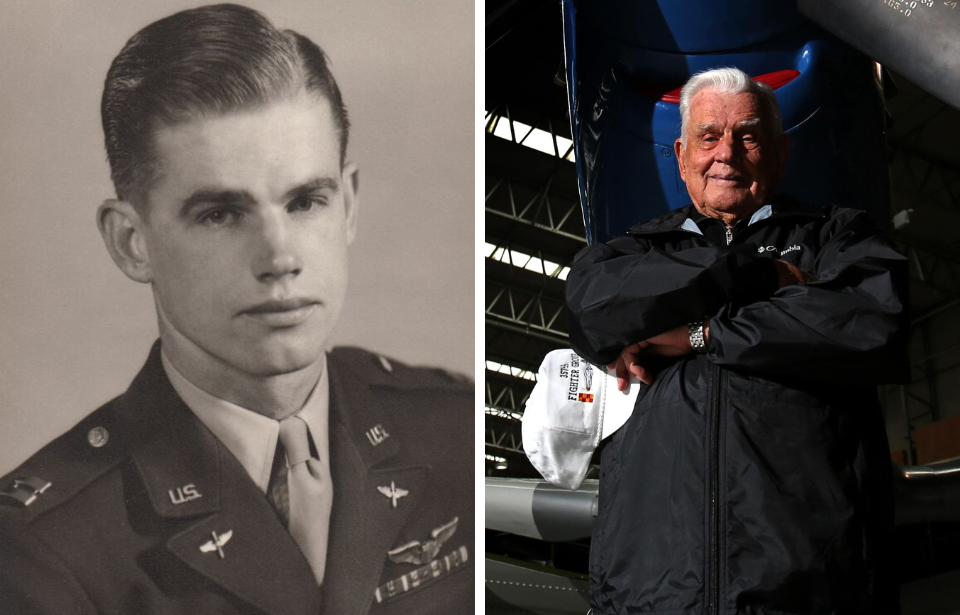It was late in the Second World War – 1944, to be exact – when Clarence “Bud” Anderson shot down his first enemy aircraft near Hanover, Germany. In an effort to defend an Allied aircraft under attack by the Luftwaffe, he took down a Messerschmitt bf 109, as witnessed by two other pilots in his squadron.
This marked the first of many more kills Anderson would make. With an impressive career as a fighter pilot, he skillfully earned the honored status of triple ace. His service, however, didn’t end there – he served in both Korea and Vietnam and became a test pilot for an interesting (and dangerous) project with the US Air Force.
Bud Anderson’s early life and enlistment with the US military
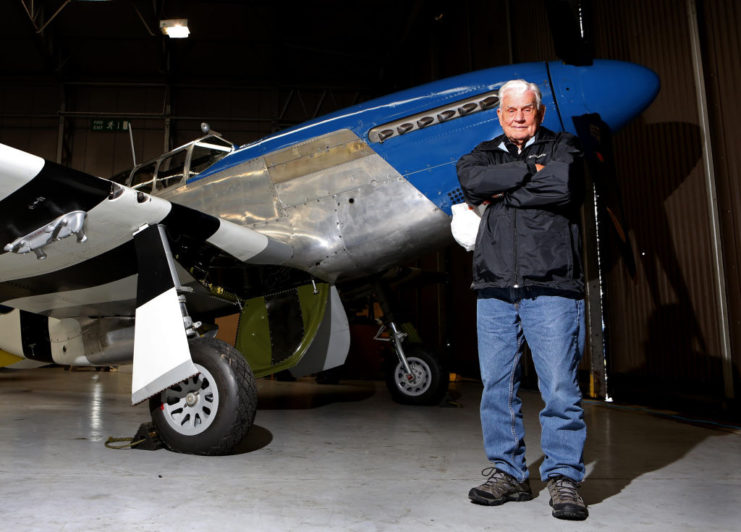
Clarence “Bud” Anderson was born in Oakland, California, and spent his childhood on a farm near Newcastle. He was no stranger to flight before the start of the Second World War. When he was a child, his father introduced him to flying, and he flew with him in a Boeing-Stearman Model 75 biplane at the age of seven.
Anderson was a student at Place Union High School, before attending Sacramento Junior College and George Washington University. He took a job at the Sacramento Air Depot, where he was working when the Japanese attacked Pearl Harbor in December 1941.
Shortly after, in January 1942, Anderson enlisted in the US Army’s Aviation Cadet program and was commissioned as a second lieutenant with the US Army Air Forces (USAAF).
The young airman served as a pilot with the 363rd Fighter Squadron, 357th Fighter Group, Eighth Air Force on two combat tours in Europe. The 357th – nicknamed the “Yoxford Boys” – were based near the village of Yoxford. According to them, the nickname was created by German propagandist Lord Haw Haw the night they arrived at RAF Leiston.
Becoming a triple ace
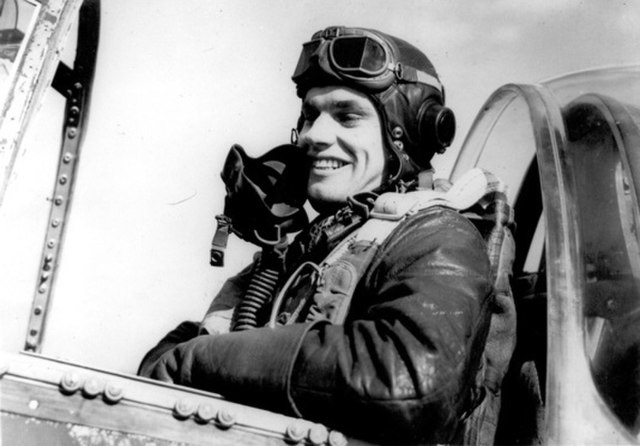
It wasn’t until late 1943/early ’44 that the 357th arrived in the United Kingdom, and, by February 11, 1944, they were officially committed to combat. The group produced 42 flying aces and destroyed roughly 609 aircraft between November 1943 and January ’45, according to VA News. Historynet estimates their overall aerial victories throughout the Second World War was actually around 595.
The 357th was also the first group in the Eighth Air Force to fly the North American P-51 Mustang.
Bud Anderson flew his first mission with the 357th on February 5, 1944, and shot down his first enemy aircraft a little under one month later. It was the aforementioned Messerschmitt Bf 109 attacking an Allied Boeing B-17 Flying Fortress near Hanover. This was the first of many victories for the would-be ace, flying his P-51D Old Crow.
Anderson was officially credited with downing 16 1/4 enemy aircraft over 116 missions. Not only did this make him a triple flying ace, but he was able to accomplish the feat without ever taking damage to his aircraft or needing to return to base for other issues. Aside from Anderson, the 357th impressively produced three other triple aces.
Bud Anderson becomes a FICON test pilot
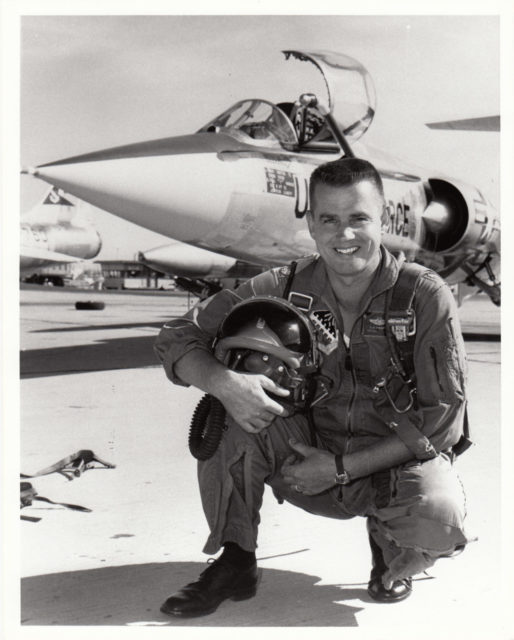
After World War II, Bud Anderson worked as a test pilot out of Wright Field, Ohio, testing Republic RF-84 Thunderflashes that were part of the Fighter Conveyor (FICON) Program. FICON was designed to test whether a Convair B-36 Peacemaker could carry an RF-84 in its bomb bay or attached in another manner, to increase the effective combat radius of jet fighters and allow bombers to carry their own fighter escorts into enemy territory.
Anderson worked to figure out the best way for the RF-84 to be mounted to the larger aircraft, trying both the underside and the tips of the B-36’s wings. He would fly in one of the mounted fighter-bombers and detach it while the B-36 was in the air. Testing was successful, but implementation was limited and short-lived.
Serving in Korea and Vietnam
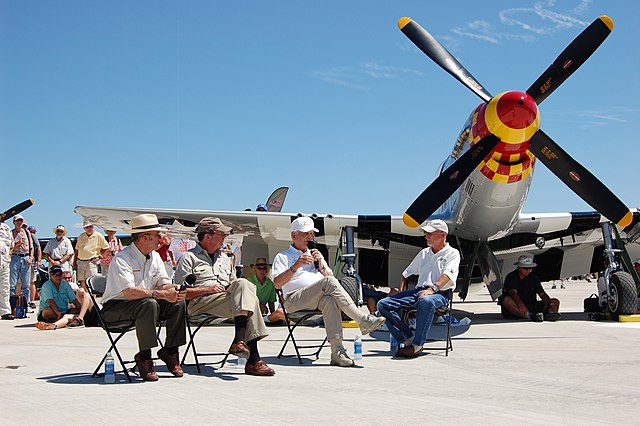
From September 1954 to August ’55, Anderson attended the Air Command and Staff College, before being sent to Osan Air Base in Korea to serve as the director of operations for the 58th Fighter-Bomber Wing. In 1956, he took over command of the 58th’s 69th Fighter-Bomber Squadron. Finally, he was the executive officer of the 6511th Parachute Test Group in California, serving in the position until November 1957.
Toward the end of the Vietnam War, Anderson moved to command the 355th Tactical Fighter Wing, which flew the Republic F-105 Thunderchief. The unit flew out of Takhli Royal Thai Air Force Base and mounted attacks against enemy supply lines. When the 355th was deactivated at the end of the conflict, Anderson was responsible for closing down the base.
Bud Anderson kept busy following his retirement
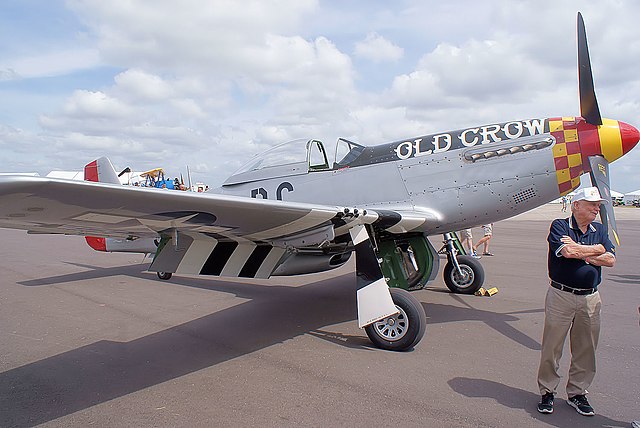
Bud Anderson retired from the US Air Force in March 1972, having flown over 100 types of aircraft and logging more than 7,000 hours of flight time. Following his retirement, he took charge of McDonnell Aircraft Company’s Flight Test Facility at Edwards Air Force Base, California.
In the decades after his service, he was inducted into the National Aviation Hall of Fame; the San Diego Air & Space Museum’s International Air & Space Hall of Fame; and the EAA Warbirds of America Hall of Fame. Anderson also received an impressive number of awards for his service during the Second World War and in Korea and Vietnam, including two Legions of Merit, five Distinguished Flying Crosses, a Bronze Star, 16 Air Medals and a French Croix de Guerre.
In later years, he was also given the Air & Space Forces Association’s Lifetime Achievement Award.
While he’d decided at 90 that he was done with flying, Anderson continued giving talks about his experiences. Brig. Gen. Chuck Yeager, a flying ace and the first confirmed test pilot to exceed the speed of sound, called him “the best fighter pilot [he’d] ever seen.”
More from us: US Air Force Pilot Richard Ritchie Shot Down Five Enemy Aircraft in Vietnam
Want War History Online‘s content sent directly to your inbox? Sign up for our newsletter here!
On May 17, 2024, at 102 years old, Bud Anderson passed away in his sleep, surrounded by family. While his death marked the loss of the last of World War II’s famed triple aces, his legacy will continue to live on and inspire.
